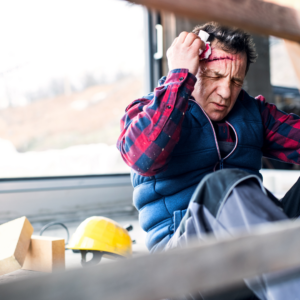How to Report Unsafe Working Conditions in Pennsylvania

The workers’ compensation attorneys here at Munley Law firm have put together this guide to help you understand the laws that protect you, how to report any hazards you find, and what to do if you get hurt on the job.
Laws Pertaining to Unsafe Working Conditions in Pennsylvania
The Occupational Safety and Health Act (OSHA) of 1970 governs workplace safety at the federal level. In Pennsylvania, the state’s laws work in tandem with OSHA to ensure that employers provide safe working environments for their employees. Employers are legally required to identify and address workplace hazards and any safety violations to prevent accidents and injuries.
OSHA administers more than twenty whistleblower protection laws, including Section 11(c) of the Occupational Safety and Health (OSH) Act, which prohibits retaliation against employees who complain about unsafe or unhealthful conditions or exercise other rights under the Act.
Right to Refuse Dangerous Work
Under OSHA, employees have the right to refuse work that presents a clear risk of serious injury or death.
To safely refuse work:
- Report the hazard to your employer, ask them to correct it, or assign you different work.
- Tell them that you won’t continue working until the problem is addressed.
- Stay at the worksite unless instructed otherwise by your employer.
Speak Directly with Your Employer
If you believe your working conditions are unsafe, bring your concerns to your employer first. Let them know about the hazard and allow them the chance to correct it. However, if the situation presents an immediate danger—like a serious risk of injury or death—you may have the legal right to refuse to work. To protect yourself, you should make sure to report the issue to your employer first and clearly explain why the task is too dangerous.
If your employer fails to fix the problem and you believe there’s a real, imminent threat to your safety, you can refuse the work in good faith. Remember, a reasonable person must agree that the danger is significant, and there may not be enough time for OSHA to inspect the issue before harm occurs.
Report Your Concern to the Local Occupational Safety and Health Administration (OSHA) Office
If your employer fails to address the dangerous working conditions, or if the issue is urgent, you can file an OSHA complaint with your local Pennsylvania OSHA office.
You can file a complaint with OSHA in Pennsylvania:
- Phone: You can call 800-321-6742 to file your report by phone, or you can use this chart to find the number for your local OSHA office phone number.
- Use the online form: You can file your complaint online by using OSHA’s Whistleblower Complaint Form.
- In-person: You can file your report in person at your local PA OSHA office.
- To report an immediate danger/life-threatening emergency: Call the OSHA toll-free number immediately: 1-800-321-OSHA (6742) or your local OSHA office to make a non-emergency report by phone. OSHA investigates unsafe working conditions and enforces safety standards. You can also use OSHA’s online whistleblower complaint form to file your employer’s safety violations.
While complaints cannot be made anonymously, you can request that OSHA not reveal your name to your employer.
What Are Unsafe Working Conditions?
Unsafe working conditions can take many forms, and recognizing the specific hazards can help you decide the best course of action. Here are some common types of hazards:
Safety Hazards
These are the most apparent hazards, including slippery floors, exposed wiring, heavy machinery without proper safety guards, or broken safety equipment. These conditions can lead to accidents such as falls, electrocution, or machinery-related injuries.
Biological Hazards
Biological hazards include exposure to harmful bacteria, viruses, or other pathogens. Healthcare, sanitation, and laboratory workers may encounter these risks, which can lead to illnesses if proper safety measures are not in place.
Ergonomic Hazards
Ergonomic hazards arise from improper workstation setups, repetitive movements, or poor posture. These hazards can cause musculoskeletal injuries, such as carpal tunnel syndrome, back pain, and other joint or muscle issues.
Chemical Hazards
Workers exposed to hazardous chemicals, such as asbestos, pesticides, or cleaning agents, face chemical hazards. Exposure can cause respiratory issues, burns, or long-term health complications such as cancer or organ damage.
Environmental Hazards
Environmental hazards include extreme temperatures, poor air quality, or inadequate lighting. These conditions can lead to heatstroke, hypothermia, or respiratory issues, depending on the severity of the exposure.
Can I Be Fired for Reporting an Unsafe Work Condition?

If you experience retaliation, you can file a separate complaint with OSHA, which will investigate the matter and may impose penalties on your employer. OSHA takes whistleblower complaints very seriously and protects PA workers from retaliation for reporting OSHA violations.
You can view, download, save and even print OSHA’s complete handout about their Whistleblower Protection Program.
What Happens After You Make a Complaint To OSHA?
Once a complaint is filed, OSHA assesses the severity of the hazard and may conduct an inspection. If they find any safety issues, they cite the employer for any violations and require the employer to address the problems. In some cases, OSHA may fine the employer for failing to provide a safe work environment.
What to Do if You Get Injured Due to Unsafe Conditions at Work
If you have suffered a serious injury due to unsafe working conditions in Pennsylvania, your first priority should be to seek medical attention. Afterward, report the injury to your employer as soon as possible. You may be entitled to workers’ comp benefits, covering medical bills and lost wages for your work injury or illness.
However, workers’ compensation may not be enough to fully address the consequences of your injury, especially if negligence was involved. In these cases, you may have grounds for a personal injury claim.
And, if a tragic workplace injury or illness has led to the death of a loved one, and unsafe conditions might have contributed to their death, you might be entitled to a wrongful death suit.
Schedule a Free Consultation With Our Pennsylvania Workplace Accident Lawyers
At Munley Law, we have more than six decades of experience representing workers injured on the job due to unsafe conditions. If you’ve been hurt and you are concerned that a hazardous work environment caused your injury, contact us today for a free consultation. Our team will review your case, explain your rights, and help you pursue the compensation you deserve.

Marion Munley
Marion Munley has been practicing personal injury law for nearly 40 years. She is triple board-certified by the National Board of Trial Advocacy for Truck Accident Law, Civil Trial Law, and Civil Practice Advocacy. She currently serves as Vice President of the American Association for Justice, an organization dedicated to safeguarding victims’ rights. Marion has won many multimillion-dollar recoveries for her clients, including one of the largest trucking accident settlements in history. She has been named a Top 10 Super Lawyer in Pennsylvania since 2023, a Best Lawyer in America, and was recently inducted to the Lawdragon Hall of Fame.
Posted in Workers' Compensation.
Tagged Claim Complaint Good Faith Hazard Negligence Request









